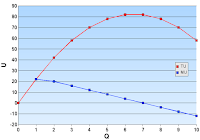By Kibash
Utility is a term used by economists to describe the measurement of "useful-ness" that a consumer obtains from any good or service. It is the satisfying power of a commodity. <
Utility may measure how much one enjoys a movie or the sense of security one gets from buying a deadbolt. The utility of any object or circumstance can be considered. Some examples include the utility from eating an apple, from living in a certain house, from voting for a specific candidate, or from having a given wireless phone plan. In fact, every decision that an individual makes in their daily life can be viewed as a comparison between the utility gained from pursuing one option or another .
Utility may be positive or negative with no effect on its interpretation. If one option gives $-15$ utility and another gives $-12$, selecting the second is not, as it might seem, the "lesser of two evils," but can only be interpreted as the better option.
Utility can be measured in one of two ways:
Ordinal Utility ranks a series of options in order of preference. This ranking does not show how much more valuable one option is than another, only that one option is preferable over another. An example of a statement reflecting ordinal utility is that "I would rather read than watch television. " Generally, ordinal utility is the preferred method for gauging utility.
Cardinal Utility also ranks a series of options in order of preference, but it also measures the magnitude of the utility differences using utils. An example of a statement reflecting cardinal utility is "I would enjoy reading three times more than watching television. " Given how difficult it is to precisely measure preference, cardinal utility is rarely used.
Assumptions
There are two major assumptions of utility theory for cardinal and ordinal utility theory.
1. Rationality : The theory of utility is based on the assumption of that individuals are rational. Rationality has a different meaning in economics than it does in common parlance. In economics, an individual is "rational" if that individual maximizes utility in their decisions. Whenever an individual is to choose between a group of options, they are rational if they choose the option that, all else equal, gives the greatest utility.
2. Perfect Knowledge: The theory is also based on the assumption that consumers have perfect and full knowledge about the product that is the quality and price


No comments:
Post a Comment